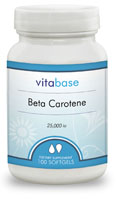| |
Sources of beta-carotene (vitamin A) |
|
| The body regulates the conversion of beta-carotene to vitamin A based on its needs. Beta carotene is one of a family of 600 carotenoids and is found in high levels in carrots, pumpkins, spinach, broccoli, Brussel sprouts, oranges, apricots and peaches. Dark green and orange-yellow vegetables are good sources of beta-carotene. It is also available in supplements. Foods rich in beta-carotene include red peppers, carrots, pumpkins, as well as those just mentioned. Most dark-green leafy vegetables and deep yellow/orange vegetables and fruits (sweet potatoes, carrots, pumpkin and other winter squashes, cantaloupe, apricots, peaches,and mangoes) contain substantial amounts of beta-carotene. By eating these beta-carotene rich foods, a person can increase their supply of vitamin A. |
|
|
|
|
